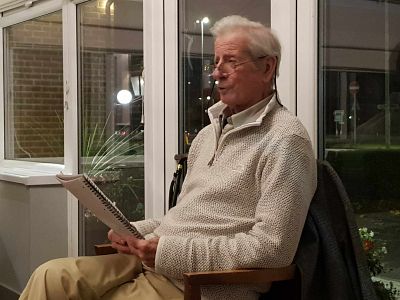In the third in a series of talks about his life, Rotarian and enthusiastic raconteur Andrew Barchi gave us more fascinating insights into the world of public health and his own long career in that field during our meeting at the Victoria Hotel.
Andrew started his talk by briefly recalling his previous talks, including one on his work in Liverpool.
After leaving Liverpool, Andrew went on to work in a number of places around the country before applying for - and accepting - a job with Canterbury City Council. It was clearly a job he enjoyed, stating that, in practice, he felt he had joined "an elite organization" because of how well it then ran.
He spoke of many projects that he worked on; he was responsible range of services, including the letting of houses and overseeing the "right to buy" scheme (which he described as a "disaster"). He was also responsible for public health services such as food hygiene and refuse collection. He touched on challenges that he faced - such as the training and knowledge of those who assessed food hygiene.
Regarding the former - he told us how it was a colleague of his that had set up the food hygiene scoring scheme that we are all now so familiar with.
Reflecting on his years at Canterbury City Council, Andrew told us how he "thoroughly enjoyed" his time at there ... but there came a time for a department shakeup and Andrew was told that he would eventually have to go. He was 52 at the time and had started his work in public health at the age of 18 - not so bad.
Andrew then looked around for other local authority jobs - but calculated that that every pound he earned for a local authority would deduct from his pension. Instead, he decided to work as a consultant - which he was allowed to do.
It was then that Andrew heard about a position at Kingston-upon-Thames. At the time, Kingston-upon-Thames owned around 28,000 houses - each with an average rent of approx. £6/week; it also had lots of leasehold flats.
Andrew got the job and got to work. We had some interesting insight into bureaucracy, budgetary challenges and differences in organisational culture (particularly of one member of staff that had come to work there from another sector). Some of the things he told us were jaw-droppingly astonishing!
Anyway, Andrew left Kingston-upon-Thames after two and a half years. He then thought he would "have a rest" - but that was never going to be Andrew! "I wanted to do something," he said! This led him to apply for the post of Chairman of a local Primary Care Trust - with a budget of £100 million per year. He got the job and his first task was to appoint three non-executive directors.
His time at the Trust was another challenging role - and key to this was that he wasn't to "interfere" with operational issues. But Andrew is not known for holding back. and it was when the roles of GPs changed so that they could opt out of out-of-hours work that he committed what he referred to as "his final sin". His bosses felt he was interfering with operational issues and he was told ""You should consider your position". "Go ahead and sack me!" was Andrew's response ... and 6 months later "that's just what they did", he mused!
Andrew wasn't too sad; by then he was 72 and could look back on a long and overall successful career with lots of achievements that he was proud of.
Andrew ended his talk there and was thanked on behalf of members by President Rosemary Doyle, who summed up his talk as "a history of 20th Century bureaucracy!" There was a brief exchange of questions and answers before someone asked Andrew: "When are you going to write a book?"
You could see Andrew's eyes light up!
Picture: Story time with Andrew recollecting anecdotes from his long career. Picture credit: Rotary Club of Canterbury.



